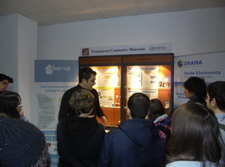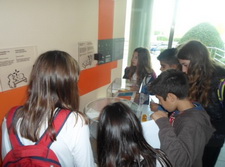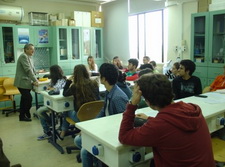The Responsible Research and Innovation framework consists of 6 keys (European Commission, 2012). These keys are taken into account in the Greek module as follows:
- Engagement: The module focuses on the role of researchers and civil society in the RRI process. This is realized: a) by the active participation of experts from the science research center "Foundation for Research & Technology - Hellas (FORTH)", and from the science museums "Eugenides Foundation" in Athens and "Natural History Museum of the University of Crete" in different phases of the module implementation and b) by presenting students’ exhibitions in a wider audience, sharing this way a part of current cutting-edge scientific knowledge with the local society.
- Gender Equality: Firstly we ensured that the participating classes are gender-balanced (male students 50 – female students 45), in order to – both girls and boys – be able to acquaint a cutting edge science as nanotechnology. ?hereafter and more particularly, the module attempts to address gender equality through a targeted discussion based on NST extracts from media and a lecture held by an expert on gender-issues.
- Science Education: Via the module’s activities students are brought in contact with various aspects of nanoscience as: size and scale, size-dependent properties as well as Science-Technology- Society issues which simultaneously are used to raise their awareness on RRI issues.
- Open Access: The module addresses the transparency and accessibility of research and innovation by the participation of researchers from FORTH who shared the latest advances in NST with the students.
- Ethics: The ethics parameter is approached by an intensive discussion with students, on benefits and risks of NST applications as well as by students’ interaction with scientists (from FORTH and UoC) on ethical aspects of NST.
- Governance: During the discussion about ethical aspects of using new products the need of regulations by stakeholders arises.



From left to right: students visiting the research center, visiting the science center, experts in the classroom.








